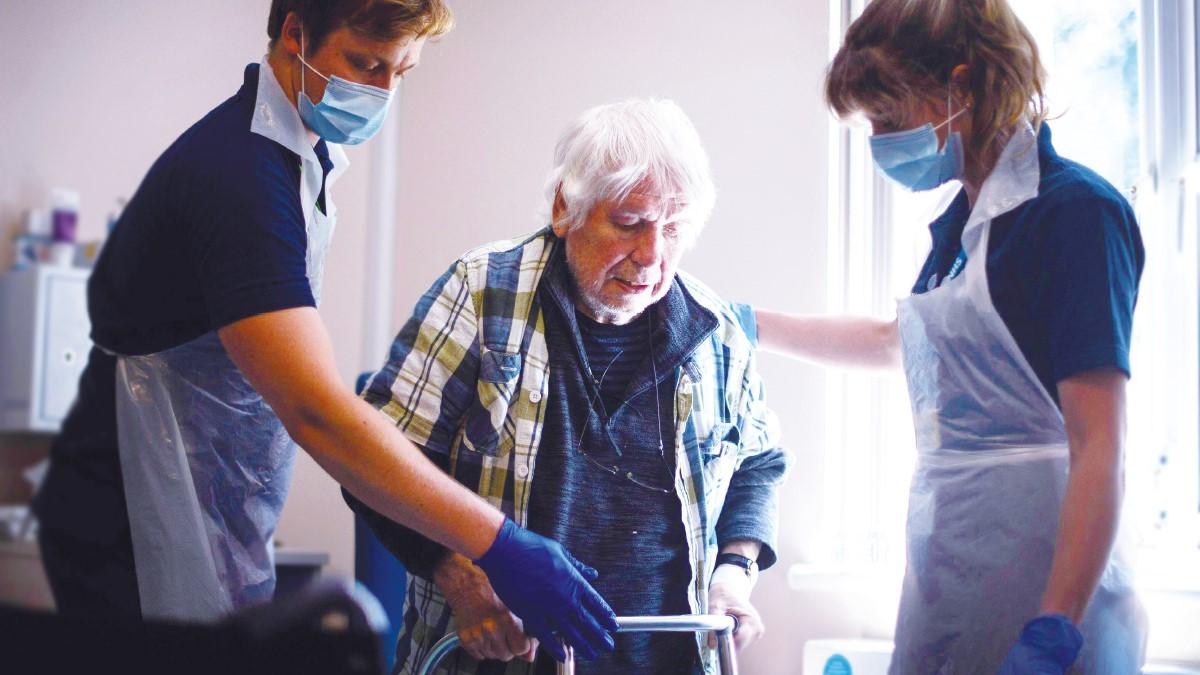Physiotherapy is a vital component in the response to the pandemic and all recovering patients have the #Righttorehab
The CSP has long acknowledged the importance of community rehabilitation and the crucial need for change.
We asked politicians in 2016 to pledge to #BackRehab in the lead up to elections, highlighted that #RehabMatters in 2017, and we are now campaigning with others that everyone has a #RighttoRehab.
Progress has been frustrating, services remain under resourced and there is wide national variation. The analogy of a phoenix from the ashes has been used to describe the opportunity for community rehab post-Covid-19. Our time is now and we must ensure we grasp it
The global pandemic has changed the face of health and social care across the UK. Physiotherapists, as core members of the multidisciplinary team, have responded in great numbers and with expert professionalism. The CSP has been listening to members and watching the data emerging to understand the clinical profile and physiotherapy requirements of people recovering from Covid-19. It is indisputable that physiotherapy is a vital component in the response to the pandemic, and not only saves lives but, more importantly, adds years to life.
A co-ordinated system coupled with clinically reasoned interventions will enhance the extraordinary response seen in the acute phase of the pandemic response.
We know little of the long-term impact of Covid-19 but we do know that high quality rehabilitation can:
- facilitate people to return to their normal level of function n adapt to changes in their functional level
- support people to make sense of their illness and recovery
As more people recover from acute illness we will learn more about the unique rehabilitation needs of this patient cohort. It is likely a new model for rehabilitation for those recovering from Covid-19 will emerge; we are already seeing innovative examples of our unique and expert contribution to the multidisciplinary rehabilitation team.
However we must also acknowledge that, during the pandemic, people continued to experience other illnesses and injuries, and most rehabilitation in the community ceased. In addition, we have seen fewer people presenting at hospital with stroke and chest pain, and referrals to oncology teams are down: all patient populations who might traditionally require physiotherapy as part of their rehabilitation. Future planning of rehabilitation services must consider all of these factors and it is imperative that we remember that these teams were under-resourced and over-capacity prior to this pandemic.
We have seen undeniable successes with new ways of working such as the use of remote and virtual consultations.
We advocate that these solutions are embedded in delivery pathways to support rehabilitation going forward. We have heard many examples of where acute and community services have worked closer together to achieve seamless care and enhance patient experience. We witnessed the rapid upskilling of staff to blur professional boundaries to best meet patient need.
We must continue to build on all of these lessons.
Our opportunity is here now. While the initial focus on saving a life in the acute hospital was a headline grabber, rehabilitation is less sexy and a bigger conundrum. We must keep it high on the public’s and politicians’ agenda and ensure it gains the attention it both needs and deserves.
In Cornwall the majority of the Covid-19 positive patients were in the community or community hospitals rather than the acute trust. As a result, some of the acute physiotherapists were seconded to work within community hospitals and teams. This was particularly effective in the three hotels that were set up as temporary care homes. The acute physios worked with their community and social care colleagues as part of the MDT ensuring that patients were able to return home safely with increased levels of activity and reduced packages of care. As a result, both the acute and community clinicians developed a greater understanding of each other’s roles and has led to more integrated working within the local health and social care system.
We must collectively demonstrate the contribution of physiotherapy and that saving a life is only the beginning. We must find a way to collect relevant data which emphasises the true cost and value we bring. We must rethink and re-model our services if the phoenix from the ashes analogy is to be recognised. Otherwise we are in danger of seeing only the embers and what might have been.
The CSP’s Professional Advice Service gives advice and support to members on complex and specialist enquiries about physiotherapy practice, including professional practice issues, standards, values and behaviours, international working, service design and commissioning, and policy in practice.
- Early innovative examples:
- Lancashire Teaching Hospital 'COVID-19: Supporting your recovery'
- Cardiff and the Vale university Keeping Me Well
Number of subscribers: 3

